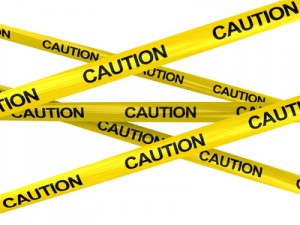Personal Responsibility.
Over the past week I heard no less than 5 news stories about someone who chose not to follow certain rules, was injured in some way as a result of their actions, but who blamed someone else for their unfortunate outcome. The irony is, in every instance, the network news anchor, spinning the story, downplayed the poor choice those people made, and highlighted the problem being someone else’s’ fault. Here are two examples:
- Reckless Disregard. A Ft. Lauderdale woman, Wanda McGowan, was participating in a 5K walk for a breast cancer charity. As with all races, there was a specified route the walkers were required to take. Wanda, who is legally blind, did not have a companion and chose to take a different route. Despite the fact that there were warning signs saying No Pedestrians, and a warning sound alerting her to the fact that the bridge was being raised, she chose to walk across the bridge. The bridge was raised and she was trapped. She said in response to why she took the bridge despite the warning signs, “I didn’t see them, because I’m legally blind.”In reporting the reporting, the focus was on her doing this good deed—walking for charity. There was only a casual mention that she was off-route and ignored the warning.
- Breach of Contract. Here is another instance of someone thinking the rules don’t apply to them. In San Francisco a ship owner uses his empty docked vessel Maritol as an incubator for emerging entrepreneurs. Providing a place for young creative entrepreneurs to hone their ideas is a beautiful thing. The problem is, the owner of the Maritol is breaking the rules. He is in violation of his lease, which provides that the rented space cannot be used as a residence or a work premise. He has been given until the end of October to vacate the premises. He feels he has been unfairly treated.In reporting this story, the focus was on the good deed the entrepreneurial incubator caused, and only a casual mention that the owner was in violation of his lease.
Accountability.
In both cases, there was an implied belief that rules are to be broken, that they apply to other people. Wanda’s reckless disregard of the rules and the warnings caused her injury. The ship owner’s reckless disregard of his lease caused his injury—being evicted.
What if Wanda was killed? Her family would be the first to file a wrongful death claim. Yet, was it not Wanda who had a duty to follow the rules and protect herself? If she’s legally blind, should she have even been there by herself with a companion? A good argument could be made that she did have a duty and because she breached her duty she caused her own injury. What do you think? What if one of the entrepreneurs was injured on the Maritol? I’d bet his/her family would try and sue the landlord for negligence. Yet a good argument could be made that the ship owner was negligent. He had a duty to abide by his lease, and because he violated his lease he caused his eviction.
What do you think?
I’m Attorney Francine Ward and I am interested in your opinion. Join the conversation on my Legal Facebook Fan Page, Twitter, and in one of my LinkedIn groups.











